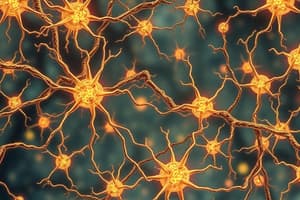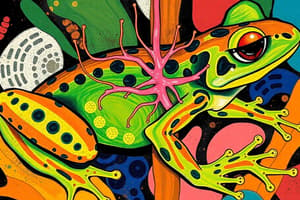Podcast
Questions and Answers
What is the primary role of axons in neurons?
What is the primary role of axons in neurons?
- Transmit nerve impulses towards the cell body
- Store neurotransmitters
- Transmit nerve impulses away from the cell body (correct)
- Form myelin sheaths
Which type of neuron is characterized by having one axon and one dendrite?
Which type of neuron is characterized by having one axon and one dendrite?
- Tripolar neuron
- Unipolar neuron
- Multipolar neuron
- Bipolar neuron (correct)
What is the function of the nodes of Ranvier?
What is the function of the nodes of Ranvier?
- Store ions for future nerve impulses
- Increase the thickness of the myelin sheath
- Conduct electrical impulses slower
- Allow for saltatory conduction of nerve impulses (correct)
When a neuron is at rest, which ion is the axonal membrane more permeable to?
When a neuron is at rest, which ion is the axonal membrane more permeable to?
What maintains the ionic gradients across the resting membrane of a neuron?
What maintains the ionic gradients across the resting membrane of a neuron?
Which of the following statements correctly describes myelinated nerve fibers?
Which of the following statements correctly describes myelinated nerve fibers?
Why is the inner surface of the axonal membrane negatively charged at rest?
Why is the inner surface of the axonal membrane negatively charged at rest?
In which stage is a unipolar neuron primarily found?
In which stage is a unipolar neuron primarily found?
What are the two main parts of the human neural system?
What are the two main parts of the human neural system?
Which type of nerve fibres transmit regulatory impulses from the CNS to peripheral tissues?
Which type of nerve fibres transmit regulatory impulses from the CNS to peripheral tissues?
Which division of the peripheral neural system is responsible for relaying impulses to skeletal muscles?
Which division of the peripheral neural system is responsible for relaying impulses to skeletal muscles?
What are the three major parts of a neuron?
What are the three major parts of a neuron?
What role do dendrites play in a neuron?
What role do dendrites play in a neuron?
Which component of the peripheral nervous system sends impulses to involuntary organs?
Which component of the peripheral nervous system sends impulses to involuntary organs?
What are Nissl's granules primarily associated with in a neuron?
What are Nissl's granules primarily associated with in a neuron?
Which structure at the end of the axon contains synaptic vesicles?
Which structure at the end of the axon contains synaptic vesicles?
Flashcards
Neuron
Neuron
A specialized cell in the neural system that detects, receives, and transmits stimuli.
Central Nervous System (CNS)
Central Nervous System (CNS)
The brain and spinal cord; responsible for information processing and control.
Peripheral Nervous System (PNS)
Peripheral Nervous System (PNS)
All nerves outside the brain and spinal cord that connect the CNS to the rest of the body.
Afferent fibers
Afferent fibers
Signup and view all the flashcards
Efferent fibers
Efferent fibers
Signup and view all the flashcards
Neuron structure
Neuron structure
Signup and view all the flashcards
Somatic NS
Somatic NS
Signup and view all the flashcards
Autonomic NS
Autonomic NS
Signup and view all the flashcards
Axon Function
Axon Function
Signup and view all the flashcards
Neuron Types
Neuron Types
Signup and view all the flashcards
Myelinated Axon
Myelinated Axon
Signup and view all the flashcards
Non-Myelinated Axon
Non-Myelinated Axon
Signup and view all the flashcards
Neuron Polarization
Neuron Polarization
Signup and view all the flashcards
Resting Potential
Resting Potential
Signup and view all the flashcards
Sodium-Potassium Pump
Sodium-Potassium Pump
Signup and view all the flashcards
Concentration Gradients
Concentration Gradients
Signup and view all the flashcards
Study Notes
Animal Neural Systems
- Animal nervous systems are composed of specialized cells called neurons that detect, receive, and transmit stimuli.
- Lower invertebrates have simple neural networks (e.g., Hydra).
- Insects have a more organized system with a brain, ganglia, and neural tissues.
- Vertebrates possess the most developed neural systems.
Human Neural System
-
Divided into central nervous system (CNS) and peripheral nervous system (PNS).
-
CNS: brain and spinal cord; responsible for information processing and control.
-
PNS: all nerves connected to the CNS; contains afferent and efferent fibers.
- Afferent fibers: transmit impulses from tissues/organs to the CNS.
- Efferent fibers: transmit impulses from the CNS to peripheral tissues/organs.
-
PNS also includes:
- Somatic neural system: relays impulses to skeletal muscles.
- Autonomic neural system: regulates involuntary organs/smooth muscles.
- Sympathetic and parasympathetic systems: further subdivisions of the autonomic system.
- Visceral nervous system: complex network involving nerves, fibers, ganglia, and plexuses for visceral impulse transmission.
Neuron Structure and Function
-
Neurons are microscopic, structural and functional units of the nervous system.
- Three main parts: cell body, dendrites, and axon.
- Cell body: contains cytoplasm and Nissl's granules.
- Dendrites: short, branching fibers extending from the cell body; receive impulses. Have Nissl's granules.
- Axon: long fiber that transmits impulses away from the cell body; also has branches ending in synaptic knobs. Synaptic knobs contain synaptic vesicles with neurotransmitters.
-
Neuron types based on axon and dendrite configuration:
- Multipolar: one axon, multiple dendrites (e.g., cerebral cortex)
- Bipolar: one axon, one dendrite (e.g., retina)
- Unipolar: one axon, single projection that branches into separate afferent and efferent fibers.
-
Axon types:
- Myelinated: insulated by Schwann cells forming a myelin sheath; have gaps (nodes of Ranvier) between myelin segments.
- Found in cranial and spinal nerves.
- Unmyelinated: Schwann cell surrounds axon but doesn't create a myelin sheath.
- Common in autonomic and somatic neural systems.
- Myelinated: insulated by Schwann cells forming a myelin sheath; have gaps (nodes of Ranvier) between myelin segments.
Nerve Impulse Generation and Conduction
- Neuron membranes are polarized.
- Ion channels allow selective ion permeability.
- At rest, axonal membranes are more permeable to potassium ions (K+) and less permeable to sodium ions (Na+). Inner membrane has high K+, negatively charged proteins, and low Na+, outer membrane is more positive.
- Ionic gradients maintained by active transport (sodium-potassium pump): 3 Na+ pumped out, 2 K+ pumped in.
Studying That Suits You
Use AI to generate personalized quizzes and flashcards to suit your learning preferences.




